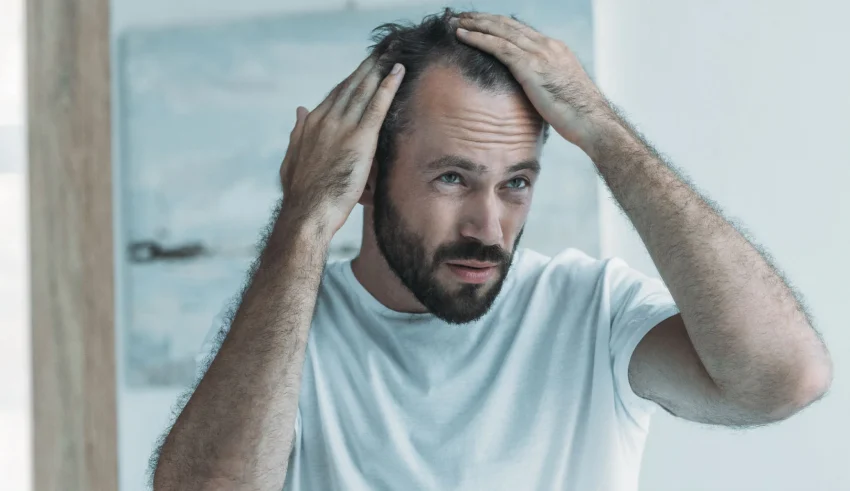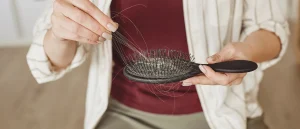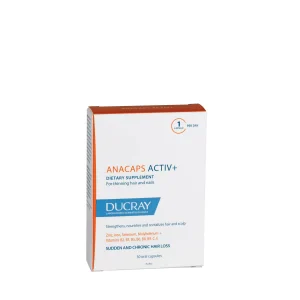
Healthy, nourished, and full hair is an attribute that almost everyone wants. Any vitamin deficiency can lead to hair loss, thinning, and dryness. Hair needs many vitamins that support hair structure, promote hair growth and moisturize the scalp, resulting in shiny hair. If your diet isn’t providing enough nutrients, supplements can improve the overall health of your hair. To find out what type of vitamins for hair loss you should rely on, we reached out to the dermatologist Dr. Marguerita Habre.
What is the role of vitamins for hair loss?
Hair loss is a common problem that can be prevented by vitamin and mineral supplementation. Vitamins and minerals are important for normal cell growth and function and might lead to hair loss when they are deficient. While supplementation is relatively affordable and readily available, it is important to know which minerals and vitamins help reduce hair loss.
According to Dr. Marguerita Habre, if hair loss is accompanied by fatigue, shortness of breath, or heart palpitations, look for a possible nutrient deficiency.
If you have thinning hair, it’s important to determine the cause of hair loss before deciding on a treatment. Are you losing your hair because of a hormonal change? Do you have a vitamin deficiency that is causing hair thinning? It is important to understand the reason for your hair loss to determine which products may be helpful.
Does magnesium deficiency cause hair loss?
According to Dr. Marguerita Habre, magnesium plays a major role in hair growth. Two key points to remember:
1- It prevents calcium buildup: Blood vessel walls can accumulate calcium, resulting in a lack of blood supply to hair follicles. Magnesium plays a role in dissolving calcium deposits in the vessels, which improves the blood supply to the hair follicles.
In addition, calcium can accumulate on the scalp, leading to inflammation and devitalized hair.
2- It helps in protein synthesis: Hair follicles are composed of protein; magnesium is an essential factor in protein synthesis. An adequate daily intake of magnesium is the key to healthy hair growth and cycle.

Can iron deficiency cause hair loss?
Dr. Marguerita Habre points out that iron is an important mineral for hair growth. It is also a crucial component of hemoglobin, a protein found in red blood cells. Hemoglobin is responsible for transporting oxygen to all organs in the body, including hair follicles. Dr. Marguerita Habre explains that in case of iron deficiency, anemia can occur. Our body will go into survival mode, bringing oxygen to vital organs (heart, brain, lungs, kidneys, liver…) by first sacrificing the hair follicles.
She clarifies that iron deficiency anemia can be caused by:
- Foods that contain a low or insufficient amount of iron.
- A problem with the absorption of iron by the body.
- Blood loss: heavy menstruation, gastric bleeding, or any other cause of bleeding.
Does zinc deficiency cause hair loss?
Zinc is an essential mineral that is involved in several biological processes in your body. It is a mineral that your body needs, but cannot store.
Zinc is essential for hair growth and repair. It allows the sebaceous glands around the hair follicles to function properly. Zinc deficiency causes hair loss and damages existing hair, which then breaks easily.
Hair loss can be the result of a deficiency in any of the vital nutrients we discussed earlier. The good news is that by correcting your nutrient levels, you can help slow or even stop hair loss. In addition to iron, vitamin D, and zinc, these four vitamins can also help you have healthier hair.
- Vitamin A: Vitamin A moisturizes existing hair and promotes hair growth.
- Vitamin B: There are many different B vitamins. The best known one for hair growth is biotin. Vitamin B transports oxygen and nutrients to the scalp.
- Vitamin C: Vitamin C is necessary for the creation of collagen protein, an important component of hair structure.
- Vitamin E: Vitamin E is a powerful antioxidant that fights free radicals, which can hinder or alter hair growth.
Should you take vitamins for hair loss?
Diet is the best source of the vitamins you need for hair growth. However, supplements can also be helpful. According to research, supplements are most effective in people who are already deficient. Also, high doses of vitamins and minerals can be harmful if you are not deficient. So, work with a doctor to determine whether or not you have a deficiency. Ultimately, the best way to get these nutrients is through a balanced diet based on real foods and including many nutrient-rich foods.
To help you, we highly recommend the hair vitamin supplements below that help revitalize your hair and strengthen it from the follicles.
Ducray Anacaps Food Supplements
Both men and women can suffer from hair loss. This is often due to genetics or a deficiency of iron, vitamin D, or zinc. To have healthy hair, it is essential to have healthy levels of necessary nutrients or minerals. Beauty does come from within.









